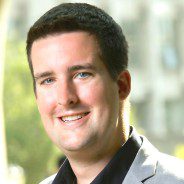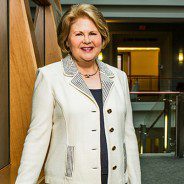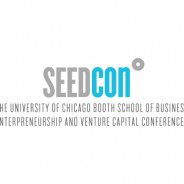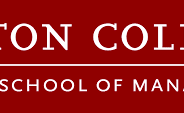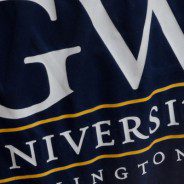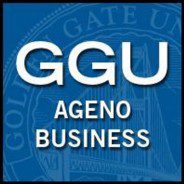Search results for :
Ageno Hosts Express Admissions Event
The Edward S. Ageno School of Business will be hosting an Express Admission event March 18, from noon until 2 p.m. The event will be held at the Golden Gate University campus. There is no cost to those who wish to attend. Registration for the event can be completed online and should be submitted prior to the event.
During the Express Admissions event, attendants will have the opportunity to speak with Golden Gate University’s enrollment team. Prospective students can find out how to transfer credit, finance their education and complete an application. Prospective students should bring their transcripts from all previously attended higher education institutions and work with GGU staff to enroll in classes.
Haas Prof Receives SAGE Young Scholars Award
Haas School of Business Marketing Professor Clayton Critcher has received the SAGE Young Scholars Award. The award is given to outstanding young researchers in personality and social psychology. Critcher focuses his research on how people navigate life as economic, political and oral beings and consumer behavior. He is one of five recipients of the award and will receive a one-time award of $5,000 to be used for research, study, or conference travel-related purposes.
The award is given by the Foundation for Personality and Social Psychology in Collaboration with SAGE Publications. FPSP is designed to provide support for wide-ranging, forward-looking, long-term activities that could enhance the discipline of personality and social psychology. It focuses on development and fundraising, seeking gifts and donations to fund activities that have the potential to augment and broaden the vigor of the field. SAGE Publications is a publisher of hundreds of academic journals and text books.
Can MBA Applicants Overcome a Low GPA?
Low GPA – Undergraduate
If you have an undergraduate GPA lower than a 3.0 (or B average) or a few low grades sprinkled into an otherwise spotless academic record, you have a hurdle to overcome when applying to MBA programs: convincing the admissions committee (the adcom) at the program of your choice that your performance as an undergraduate is not indicative of your ability to succeed in an MBA program.
The lower marks on your transcript need to come across as the result of immaturity and an accompanying lack of motivation to study (for any number of reasons). If you don’t acknowledge your low GPA, it could signal a lack of self-awareness indicative of continued immaturity to the adcom. Worse yet, a problematic transcript submitted without explanation or resolution could cause the adcom to question your academic ability even if your GMAT and other application materials are strong.
While it is difficult to overcome a low GPA, ignoring the fact of the matter is an illogical strategy.
Full Time MBA Vs Part Time MBA
First Steps
Deciding you need and want an MBA is the first step. From there, you’ll have to determine whether pursuing the degree full time best serves your purpose, or whether attending MBA courses part time is a better fit with your goals. Other factors to consider are part time vs full time MBA salary, as well as the respective admissions process for each. Continue reading…
Can a Regional MBA Program Help You Reach Your Goals?
Regional MBA’s Grow in Popularity
In September 2013, The Wall Street Journal reported that business schools in the U.S. received the highest volume of applications to MBA programs since a previous peak in 2009, at the start of the financial crisis. In 2009, applicants who may have struggled to find jobs in fields like finance and consulting sought to boost their résumés with an MBA as a means of increasing their appeal to employers. Fast-forward to 2013, and the reasons for applying have evolved, as have the programs. Regional MBA programs have increased in popularity. What’s their unique value? They prepare MBA students for regional specializations through specific coursework and access to invaluable local networks. Continue reading…
McDonough Prof. Appointed to MCL Panel
Lynn Doran, Professor at the McDonough School of Business, has been appointed as one of the 15 faculty panelist for discussing business education the 2015 Measuring College Learning (MCL) Project. The MCL is bringing together faculty from six critical fields of study — biology, business, communication, economics, history, and sociology — to reach consensus on how schools can effectively measure their students’ achievement. Continue reading…
Do Entrepreneurs Need an MBA?
Entrepreneurship has become a well-established feature of popular culture. Every Friday night in the U.S., ABC Network features Shark Tank, its hit show about everyday entrepreneurs approaching potential investors, seeking much needed capital and often receiving equally valuable advice. The entrepreneurs featured have many things in common, including a passion for their product or ideas and a palatable drive. What they often don’t have is an MBA and all that it provides. Continue reading…
Full-Time MBA
UT Austin Full-Time MBA Program Structure
UT Austin places emphasis on collaboration with others in its two-year, full-time MBA program. Before classes begin, students complete an MBA Orientation. This gives new students a chance to get to know the others who will be in their cohort. Upon arrival on campus, you’ll be carefully placed into a cohort—your MBA peers with whom you’ll navigate your first year’s core curriculum. McCombs focuses on creating a unique cohort experience by building variety through different cultural backgrounds, business concentrations and locations of each student.
Curriculum
The UT Austin full-time MBA curriculum at McCombs begins by giving each student the same fundamentals of business. This is done through the core classes, which provide a functional foundation of essential business skills like effective communication and cross-functional problem solving. It simultaneously encourages the student to customize their degree with flexible core elective requirements.
The electives can be used to focus on an academic concentration, but this is not required. There are 22 concentrations, all of which fall under one of the following areas:
– Accounting
– Business Government
– Finance
– Interdisciplinary
– Marketing
– Management
– Operations and Analytics
Dual degree options that allow students to receive an MBA, as well as another graduate degree from a different college within the University of Texas at Austin, are also available.
Class Profile
The 2021 Full-Time MBA class had 260 students, 40 percent of which identify as female. The average age of students in the class was 29. On average, students enrolled with an undergraduate GPA of 3.42, a GMAT score of 704, and 6 years of professional work experience. The average GRE score was 318.
Twenty percent of the 2021 Full-Time MBA class were international students, while 80 percent were U.S. based students. Twenty-nine percent of the class were underrepresented minorities. In terms of undergraduate majors, the most popular were business/economics at 33 percent, STEM at 31 percent, and humanities at 15 percent.
Career Statistics
The Full-Time MBA has been named Best Value by U.S. News & World Report. With the opportunity to earn six-figure starting salaries and healthy signing bonuses, earning an MBA degree from McCombs can be a great return on your investment. The median salary of UT Austin full-time MBA graduates is around $125,000 with a median signing bonus of $30,000.
McCombs full-time MBA students are provided career consultants who are available throughout the year to provide professional guidance and insight. Students also pair up with a Peer Advisor—a second-year Texas MBA student who was at your stage of career planning just a year before. In addition, as part of the Texas MBA+ Leadership program, students have access to communication and specialty coaches—i.e., seasoned experts who are ready to work with you one-on-one to refine your skills in communication, leadership, strategy, organizational culture, and much more. In student’s first semester, you will take “BA 181 – Strategic Career Planning,” a class designed to identify and begin developing your professional goals. Students perform a self-assessment, practice interviewing techniques, build out your personal brand and social media networking strategies, and learn how to research career options. Almost 400 different employers participate in our recruiting events—networking receptions, career fairs, on-campus recruiting sessions, etc.
Tuition, Scholarships, and Financial Aid
For the first year of the UT Austin full-time MBA at the McCombs School of Business, in-state students pay $51,020, and out-of-state students pay $56,572. In addition to the tuition cost, there are also the following fees: $14,048 for housing, $1,020 for books and supplies, $1,520 for transportation, $4,030 for personal expenses. The total cost of attendance for in-state, first-year students for the McCombs full-time MBA is $71,638 and $77,190 for out-of-state students.
The McCombs School of Business provides financial aid for their full-time MBA students including offering recruiting scholarship in the form of cash awards and out-of-state tuition waivers that range from $2,000 to full-tuition. Consortium members are considered for both McCombs-funded scholarship and fellowships as well as benefits offered through the Consortium for Graduate Study in Management. Lastly, McCombs is a proud partner of the Forte Foundation, Reaching OUT MBA and Teach for America. Theses scholarships can be combined with Fellows benefits.
Full-Time MBA students at McCombs are also eligible for both private and federal loans, which can help cover the total cost of attendance. Individuals can also apply for teaching and research assistantship positions, however these positions are limited. MBA students cannot take on teaching or research assistantships for more than 15 hours per week and do not gain in-state tuition by virtue of an assistantship. Students should take into account their mandatory 15-hours-per-semester course load when considering any assistantship.
Lastly, McCombs is a veteran-friendly program and provides financial aid through the Post-9/11 GI Bill and the Hazlewood Act.
Admissions for the Austin McCombs Full-Time MBA
The Austin McCombs Full-Time MBA enrolls annually with classes starting in August. The application cycle consists of three rounds, and rounds 1 & 2 are priority rounds for scholarships and fellowships. Below is a requirement checklist for admissions to the McCombs full-time MBA:
– Updated Resume
– Two Required Essays
– (1) Letter of Recommendation
– GMAT/GRE Test Scores (note – due to COVID-19, McCombs has provided a test waiver for applicants who qualify)
– TOEFL/IELTS (if international applicant)
– Official Transcripts
– Non-refundable $200 application fee
– Interview (if requested by school)
The application process can be completed on the school’s official website.
2021-2022 McCombs Full-Time MBA Application Deadlines
Applications are due no later than 11:59 p.m. CT on the day of the deadline for each round.
ROUND 1 (PRIORITY DEADLINE FOR SCHOLARSHIPS AND FELLOWSHIPS)
Application Due: October 12, 2021
Decision Delivered: December 16, 2021
Enrollment Deposit Deadline: February 3, 2022
ROUND 2
Application Due: January 6, 2022
Decision Delivered: March 24, 2022
Enrollment Deposit Deadline: April 26, 2022
ROUND 3
Application Due: March 29, 2022
Decision Delivered: May 5, 2022
Enrollment Deposit Deadline: May 17, 2022
Get an MBA Admissions Edge with the LiveWire Data Dashboard
Curious about your chances of gaining admission to top business schools? Now you can see how hundreds of previous applicants fared at McCombs in just a few clicks. The LiveWire Data Dashboard’s interactive data visualization tools allow you to spot trends, compare MBA programs, and benchmark your stats against successful applicants at your target schools. Learn more here! Ready to explore the data? Purchase a 30-Day or 365-Day subscription in our shop for immediate access!
Executive MBA
Rice University Executive MBA Program Structure
Designed for experienced executives, the top-ranked Executive MBA (EMBA) program attracts leaders from all industries and broadens student’s perspectives along with their networks. The EMBA is for students who have at least 10 years of work experience. It’s part-time, with classes all day on Fridays and Saturdays, and every other weekend.
Curriculum
The EMBA curriculum is focused on elevating leadership skills. Each academic year begins and ends with five-day intensives, targeting the development of students’ executive mindsets. EMBA students follow the core curriculum in their first year, then choose from 100+ electives in their second year. Students can cater their electives to focus on a particular academic area (accounting, energy, entrepreneurship, finance, healthcare, leadership, marketing, operations management, real estate and strategic management).
Rice also offers multiple leadership and strategy executive forums and seminars. This is all enhanced by a network of like-minded classmates and capped with an overseas trip where students consult for a global company.
Throughout the program, students work with an experienced executive coach to fill the gaps in their leadership portfolio. Each coach supports students in formalizing and executing a personal strategic development plan. The coaching program complements the leadership development curriculum, providing a safe environment for challenging assumptions and promoting new thinking.
Executive MBA Rankings
#1 Graduate Entrepreneurship Program – Princeton Review and Entrepreneur magazine, 2020, 2021, 2022, 2023, 2024
#17 Best EMBA Program – Fortune Magazine, 2024
#5 Best MBA for Finance – Princeton Review, 2023, 2024
Class Profile
Enrollment for the EMBA program is 54 students. 29% are female, 23% are from underrepresented minority groups and 7% are international. EMBA students have around 17 years of work experience.
These figures are based on a three-year average.
Tuition, Scholarships, and Financial Aid
The two-year tuition for the EMBA is $145,000 each academic year. Students pay 25% of the tuition each of the four semesters. Once accepted, students need to pay a $5,000 deposit. Tuition can be covered using personal resources, Federal Student Loans, private student loans or a semester payment plan available through the cashier’s office. Many students in the EMBA program cover their tuition needs through their company’s financial support.
Admissions
To be considered for admission to the Rice Business Executive MBA Program, applicants must complete the following steps for application:
Complete an online application, required personal essays, and a professional resume. Standardized tests are not required.
You’ll need to submit one confidential, professional recommendation from a current or previous supervisor. If you don’t have one from your supervisor, you should submit two confidential recommendations highlighting your professional abilities.
There is a $200 application fee payable online or by check.
Application deadlines are as follows:
Class of 2027 Executive MBA Application Deadlines
|
|||||||||||||||
|---|---|---|---|---|---|---|---|---|---|---|---|---|---|---|---|
Professional MBA
Rice University Professional MBA Program Structure
The Rice University Professional MBA is a flexible program that offers an evening or weekend option to allow students to maintain their current work schedules. Students following either of the program structures must complete 54 credit hours and will complete their MBA degree in 22 months.
Curriculum
Similar to the Full-Time program, during the first year of the PMBA program, students embark on the Global Field Experience (GFE), a hands-on international project that’s part of the core curriculum. Working in small teams, students tackle real business challenges for local companies and non-profits, gaining practical insights and making a meaningful impact.
Students will also participate in the core courses required to build a foundation in business. During the second year of the program, PMBA students can select across the entire range of 100+ MBA electives, including popular courses like Managing Energy Transitions, The New Enterprise, Corporate Rivalry, genAI: Strategy and Innovation, and Scandals and Reputation Management.
Although PMBA students are not able to declare a specialization, they can cater their electives to focus on a particular academic area (including accounting, energy, entrepreneurship, finance, healthcare, leadership, marketing, operations management, real estate and strategic management).
The program is also STEM-designated.
Rice University Professional MBA Rankings
- #1 Graduate Entrepreneurship – Princeton Review and Entrepreneur Magazine, 2020, 2021, 2022, 2023, 2024
- #7 Best Part-Time MBA Program – Fortune, 2024
- #15 Best Part-Time MBA Program – U.S. News and World Report
- #5 Best MBA for Finance – Princeton Review, 2023, 2024
Class Profile
Enrollment for the PMBA program is 182. About 32% of the class are women, 34% of the class are from underrepresented minority groups and 7% of the class are international students. The average GMAT is 663, and the average GPA is 3.3. Students typically enroll with eight years of work experience.
These figures are based on a three-year average.
Tuition, Scholarships, and Financial Aid
The total cost for the Rice University MBA for Professionals is $123,500 for the Evening and Evening Extended programs and $129,500 for the Weekend program.
The tuition covers the complete 22-month schedule of coursework and is billed in 25% increments over four semesters. An enrollment deposit of $2,500 is due upon acceptance and will be applied toward your first-semester bill. Many students supplement their tuition costs through company financial support. Students may also cover tuition costs with Federal Financial Aid, Federal Student Loans, and private loans.
Rice University Professional MBA Admissions
To be considered for admission to the Rice Business Part-Time MBA Program, applicants must complete the following steps for application:
Complete an online application, required personal essays, and a professional resume.
You must also submit a standardized test score for admission to the program (GMAT or GRE).
You’ll need to submit one confidential, professional recommendation from a current or previous supervisor. If you don’t have one from your supervisor, you should submit two confidential recommendations highlighting your professional abilities.
There is a $200 application fee payable online or by check.
Application deadlines are as follows:
| DECISION ROUND | APPLICATION DEADLINE | DECISION DATE |
| Round 1 | October 14, 2024, 11:59 PM CT | Applications will be evaluated for admission on a rolling basis. |
| Round 2 | January 6, 2025, 11:59 PM CT | |
| Round 3 | March 10, 2025, 11:59 PM CT | |
| Round 4 | April 28, 2025, 11:59 PM CT | Applications will be evaluated for admission on a space-available basis. |
Full-Time MBA
Rice University Full-Time MBA Program Structure
Rice University’s Full-Time MBA is a two-year program designed for students looking to transform their careers and develop the quantitative chops and workplace skills that employers want.
Curriculum
Rice University full-time MBA students are required to complete 60 credits for graduation.
In the first year, students embark on the Global Field Experience (GFE), a hands-on international project that’s part of the core curriculum. This immersive course provides valuable global consulting experience, setting students up to become effective global business leaders. Working in small teams, students tackle real business challenges for local companies and non-profits, gaining practical insights and making a meaningful impact.
During the second year of the program, students can tailor their MBA journey to their career aspirations by choosing from a wide array of electives. Popular electives include Managing Energy Transitions, The New Enterprise, Corporate Rivalry, genAI: Strategy and Innovation, and Scandals and Reputation Management.
Specializations for the Full-Time program include accounting, energy, entrepreneurship, finance, healthcare, leadership, marketing, operations management, real estate and strategic management. The MBA program also has a STEM designation.
Full-Time MBA Rankings
- #1 Best MBA in Texas – (based on global rankings) Financial Times, 2024
- #1 Graduate Entrepreneurship Program – Princeton Review and Entrepreneur magazine, 2020, 2021, 2022, 2023, 2024
- #21 Best MBA in the U.S. – (based on global rankings) Financial Times, 2024
- #19 Best Full-Time MBA Program in the U.S. – Bloomberg Businessweek, 2023-2024
- #29 Best MBA Program – U.S. News and World Report
- #24 Best MBA Program – Fortune, 2024
- #5 Best MBA for Finance – Princeton Review, 2023, 2024
Class Profile
Full-Time MBA enrollment is 166 students. 36% of the full-time class are women, 30% are underrepresented minority students and 42% are international students. These students earned an average GMAT score of 702, a GPA of 3.46 and their average work experience is five years. These figures are based on a three-year average.
Career Statistics
The most recent graduating class received an average base salary of about $150,000. An important part of business school is the return on investment (ROI). Even without a tuition break, the ROI of a two-year business education gives a lifetime salary ROI of 20%. Students accepted jobs in three industries in nearly equal percentages: consulting claimed 26%, followed by technology at 20% and financial services at 19%. Around 12% of students went into the energy field after graduation, and just over 7% went into healthcare. 94% accepted offers within three months of graduation, and 100% of first-year MBA students landed an internship.
Tuition, Scholarships, and Financial Aid
The projected two-year tuition for the Rice Business Full-Time MBA program is $147,000. Students will submit an enrollment deposit of $2,500 upon acceptance applied toward fall semester tuition costs. All payments are eligible to be covered by financial aid and private loans. Semester payment plans are also available through the cashier’s office.
Merit-based scholarships are available to those applying to the Full-Time MBA program. All students are automatically considered for a scholarship. Over 75% of the most recent incoming class of full-time students received some merit-based or name scholarships with the average award covering over 50% of tuition costs.
Admissions
To be considered for admission to the Rice Business Full-Time MBA Program, applicants must complete the following steps for application:
Complete an online application, required personal essays, and a professional resume.
You must also submit a standardized test score for admission to the program (GMAT or GRE).
You’ll need to submit one confidential, professional recommendation from a current or previous supervisor. If you don’t have one from your supervisor, you should submit two confidential recommendations highlighting your professional abilities.
There is a $200 application fee payable online or by check.
Class of 2027 Full-Time MBA Application Deadlines
| DECISION ROUND | APPLICATION DEADLINE | ROLLING DECISIONS RELEASED |
| Round 1 | October 14, 2024, 11:59 PM CT | Starting December 9, 2024 |
| Round 2 | January 6, 2025, 11:59 PM CT | Starting March 10, 2025 |
| Round 3 | March 10, 2025, 11:59 PM CT | Starting April 21, 2025 |
| Round 4* | April 28, 2025, 11:59 PM CT | Rolling decisions on space-available basis |
*The Round 4 deadline is for domestic candidates only (U.S. citizens or permanent residents).
Consortium Application Deadlines
| DECISION ROUND | APPLICATION DEADLINE | ROLLING DECISIONS RELEASED | ||||||
|---|---|---|---|---|---|---|---|---|
|
Rice Jones Full-Time MBA FAQ’s
Who recruits at Rice Business?
Employers who recruit include Google, Amazon, EY, Goldman Sachs and ExxonMobil, among many others.
What MBA programs are available at the Jones Graduate School of Business besides the Full-Time program?
The school has a Professional MBA (evening and weekend options), Executive MBA, Online MBA and Hybrid MBA.
Is the same degree granted in each MBA program?
Yes, all students in our different MBA formats receive the same Rice MBA degree.
When to Get an MBA?
When applying to an MBA program, what you’ve accomplished in your professional career matters a great deal. Unlike virtually every other graduate program, including those in law, medicine, engineering, and so on, the most competitive MBA candidates (and the vast majority) don’t go directly from undergrad to an MBA program. First, they join the workforce. Continue reading…
Why Get an MBA?
Benefits of an MBA
There are four broad reasons to get an MBA degree: the technical and leadership skills you will learn, the opportunity to develop your career, the opportunity to network with people with similar interests, and the importance of the MBA credential.
The academic environment of an MBA Program would provide you with fundamental technical skills that are important for success in all types of businesses (large and small, nonprofit and for-profit). Business school would provide you with an understanding of Accounting, Entrepreneurship, Finance, Marketing, Operations Management, Organizational Behavior, and Economics that is important for all business decision makers. Continue reading…
Economist Forecast 2015 at Chicago Booth Economic Outlook Conference
Three respected economists– Randall S. Kroszner, Norman R. Bobins Professor of Economics; Austan D. Goolsbee, Robert P. Gwinn Professor of Economics; and Carl R. Tannenbaum, AB ’81, MBA ’84, senior vice president and chief economist at Northern Trust Corp.– offered their forecasts at the annual Chicago Booth Economic Outlook 2015. The conference drew more than 900 alumni and business people to the Sheraton Chicago Hotel and Towers on January 15. Continue reading…
Veteran Venture Capitalists Speak to Booth Students
“If I could go back in time [to become a student at Chicago Booth again], I’d try to meet everyone I could,” said Stuart Peterson, ’95, cofounder and senior partner at Artis Ventures, a San Francisco based venture capital firm has backed such companies as YouTube and Palantir Technologies. “Classmates will help you more than you think.”
Meanwhile, Jeff Sheedy, ’95, director of international marketing at Artis Ventures, believes that success isn’t only about a good idea, but also the people around you.
“Having a strong team gives you an ability to deal with adversity and allows for pivots,” he said.
BC Creates eBook for Evening MBA
The Admissions team at the Boston College Carroll School of Management has created an eBook for students interested in the evening MBA program. Prospective students can download this eBook for free. The eBook outlines questions that the admissions team feels that prospective students should ask when considering an evening MBA program.
Some of the topics discussed in the eBook are how to tell your employer your plan to attend school while continuing to work and what to look for in a MBA program. The eBook also outlines what prospective students should ask admissions offices before applying to any program for an MBA degree.
REGISTER: George Washington World Executive MBA Lunch and Classroom Session
Are you interested in George Washington University’s World Executive MBA program? If so, join the school and its admissions department for a Saturday lunch session where you can meet current WEMBA students, program faculty and university staff. After chatting over a bite to eat, prospective MBAs will have the opportunity to sit in on a WEMBA class session. This event is taking place on Saturday, January 17, 2015 at The Four Seasons Hotel Washington, D.C. from 12:30 – 3:00 PM. Continue reading…
Ageno Hosts Express Admissions Event
The next Express Admissions event at the Edward S. Ageno School of Business will be held Jan. 28, 2015 at 12 p.m. to 2 p.m. It will be held at the Golden Gate University campus. There is no cost to those who wish to attend.
Prospective students will have the opportunity to speak with Golden Gate University’s enrollment team. Prospective students can find out how to transfer credit, finance their education and complete an application. Prospective students should bring their transcripts from all previously attended higher education institutions and work with GGU staff to enroll in classes.


